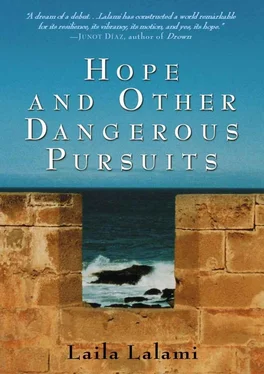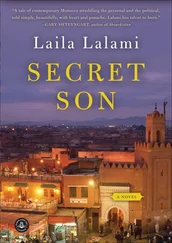Lahcen and Aziz stood up. The dentist went to the second examination room and pointed to a chair whose headrest was still in its original plastic cover. “I couldn’t get it to work,” he said, “and the installation company won’t return my calls.”
While Lahcen chatted with the doctor, Aziz examined the chair. The power cord was plugged in, but when he knelt down to look at the base he saw that there were two additional buttons. He pressed one and the chair made a whizzing sound. “The power wasn’t on,” he said.
“Oh,” said the dentist. Incredulous, he sat down on the stool and pressed various controls with his foot, the chair moving up and down on command. “Well, thanks,” he said, standing up, his eyes shifting.
Aziz watched as Lahcen went into a brief but charming speech about how his friend here could fix anything, and if the dentist would tell his colleagues, it would be most appreciated. The dentist nodded vaguely and called out to his receptionist that she could start closing the office. He took out a ten-dirham bill, which he gave to Aziz.
When they stepped out of the office, Aziz took Lahcen’s hand and stuffed the bill in it. “For your next pack of cigarettes.”
“What’s wrong?” Lahcen said.
“What am I going to do with ten dirhams?”
“At least it was something.”
“It was a waste of time,” Aziz said, pressing the call button for the elevator.
“Don’t talk that way. He’s going to tell his friends.”
“And admit how stupid he is?” Aziz gave up waiting for the elevator and ran down the stairs instead.
“Wait,” Lahcen yelled, his voice echoing in the dark staircase.
Aziz heard Lahcen miss a step, so he pushed the button for the timed light and waited for him.
AZIZ WAS CROSSING items off a packing list he’d drawn up. He wanted to take as little as possible, and he was trying to decide whether he should burden himself with a winter coat or not. Zohra suggested he take his waterproof jacket, even though it was a little too small, because it was lightweight and he could fit it into a pocket if he needed to. She had always been the practical one. Even during their courtship, Aziz had felt he was the more romantic of the two, and he’d often wondered if that meant he loved her more than she did him or if she loved him just as much, but in her own, sensible way.
The doorbell rang. It was Lahcen, asking if Aziz would like to go get a cup of coffee. “Sure,” Aziz said. There was still plenty of time to worry about packing. They walked to a café just outside the medina, on Place Mohammed V. When the waiter came by with their coffees, Lahcen insisted on paying.
“Still intent on going?” he asked.
Aziz nodded.
Lahcen launched into another speech about why this was a foolish enterprise, but Aziz tuned out after a few minutes. He watched two men, seated across from each other at a table on the street-side terrace, intently leaning toward one another, immersed in their conversation. Whatever they were talking about must have been riveting, because they were oblivious to the pretty college girls passing right by their table. One of the men smiled and touched the inside of the other’s arm, rubbing it with his thumb. Aziz looked around him to see if anyone else had noticed the gay couple, but no one seemed to pay any attention.
“Are you listening?” Lahcen asked.
Aziz looked into his friend’s brown eyes, and the memories suddenly came back to him of all the times back in high school when Lahcen had put his arm playfully around Aziz’s shoulders as they walked back home, or how he found fault with nearly every girl Aziz tried to chat up. When they’d go to the beach, Lahcen would say he didn’t want to play soccer, preferring to just lie on the sand. Tapping his hand on the towel next to him, he’d tell Aziz that he needed to learn to relax and enjoy the sun.
“Yes,” Aziz said. “I’m listening.”
“There was an article in L’Opinion about it, man. With photos of the people who drowned and everything.”
Aziz nodded. “I know all this.”
“And you’re not afraid?”
“I just think it will work out.”
“You’re insane, Ammor,” Lahcen said, shaking his head. “And where are you going to get the money?”
“My father,” Aziz said. This was not entirely true. Aziz had put together the sum he needed by combining savings from Zohra’s meager salary at the factory, a loan from a cousin, and some money from a settlement his father had received when he was in a car accident two years earlier, but he feared that sharing this information would lead to even more entreaties to give it up for the sake of everyone involved.
“Oh,” Lahcen said. He drummed his fingers on the table and pushed his coffee cup away.
Aziz felt a twinge of guilt at always dismissing his friend’s arguments and turning down his offers of help. “Don’t worry about me,” he said. “I’m the one who should be worrying about you.”
Lahcen looked up, surprised. “Me? Why?”
“Well …,” Aziz said, suddenly at a loss for words. A long minute of silence went by, and then he shrugged.
A FEW DAYS LATER, Aziz dropped by the central post office to see Lahcen. He found him standing next to a pay phone, waiting for a customer — a policeman in his gray uniform and white epaulets — to finish his longdistance call. “Have a seat,” Lahcen said, as though this public place, where people came and went, was his private office. Aziz sat in the waiting area, watching as a woman in a brown suit argued pointlessly with a teller about unauthorized charges on her phone bill, then left without getting a refund. An old man who cashed a check was immediately surrounded by a band of street urchins asking for change.
“How are you?” Lahcen asked, as he dropped into the plastic chair next to Aziz.
“Fine,” Aziz said. “Here, take this.” He handed Lahcen the tae kwon do club card he had brought for him.
“What’s this for?”
“My sisters bought me a membership as a present three months ago,” Aziz said. “And I won’t be using it anymore, so I thought you might like it.”
“Tae kwon do?” Lahcen said, laughing. “I’ve never tried it.”
“I thought you might like it,” Aziz said again, as though sheer repetition could make something come true. “And you might make new friends.”
Lahcen turned the card around in his hand and slipped it into his pocket, nodding as if he wanted to humor Aziz. “Now, do you want to go for a cup of coffee?”
“I also brought you these,” Aziz said, taking a few of his long-sleeved shirts out of a black plastic bag. He thought that they would be better for Lahcen than those tank tops he always wore to show off his biceps.
Lahcen held one of the shirts up against his chest. “You want me to look like you,” he observed.
“I just thought I’d help,” Aziz said.
“They probably won’t fit.”
“Just take them.”
“No, I can already see they won’t fit,” Lahcen said, folding up the shirts and placing them back in the bag. “You keep them.” He stood up, an eyebrow raised questioningly, waiting to see whether his friend would follow him.
“Why are you so stubborn?” Aziz asked.
“That’s a good one.”
Aziz sighed and stood up. “Fine, let’s go get coffee.”
Lahcen wanted to go back to the same café they’d been to before, near the medina, but Aziz insisted that they go to Ain Sebaa instead. “Why? The place is deserted,” Lahcen complained. Aziz replied that he wanted to meet Zohra after she got off work at the soda factory, omitting the fact that he’d convinced her to bring a friend of hers along to the café; he wanted it to be a surprise.
This time Aziz insisted on paying for the coffees. It was sunny, so they sat outside. There were few passersby, but there was quite a bit of traffic, and so they passed the time smoking and staring at the line of French and German cars waiting for the light, the drivers talking on their mobile phones while their stereos blasted American music. Aziz imagined that maybe one day he would be like them, have a car and a place to go to, instead of sitting idle at a coffee shop while his wife was at work.
Читать дальше












